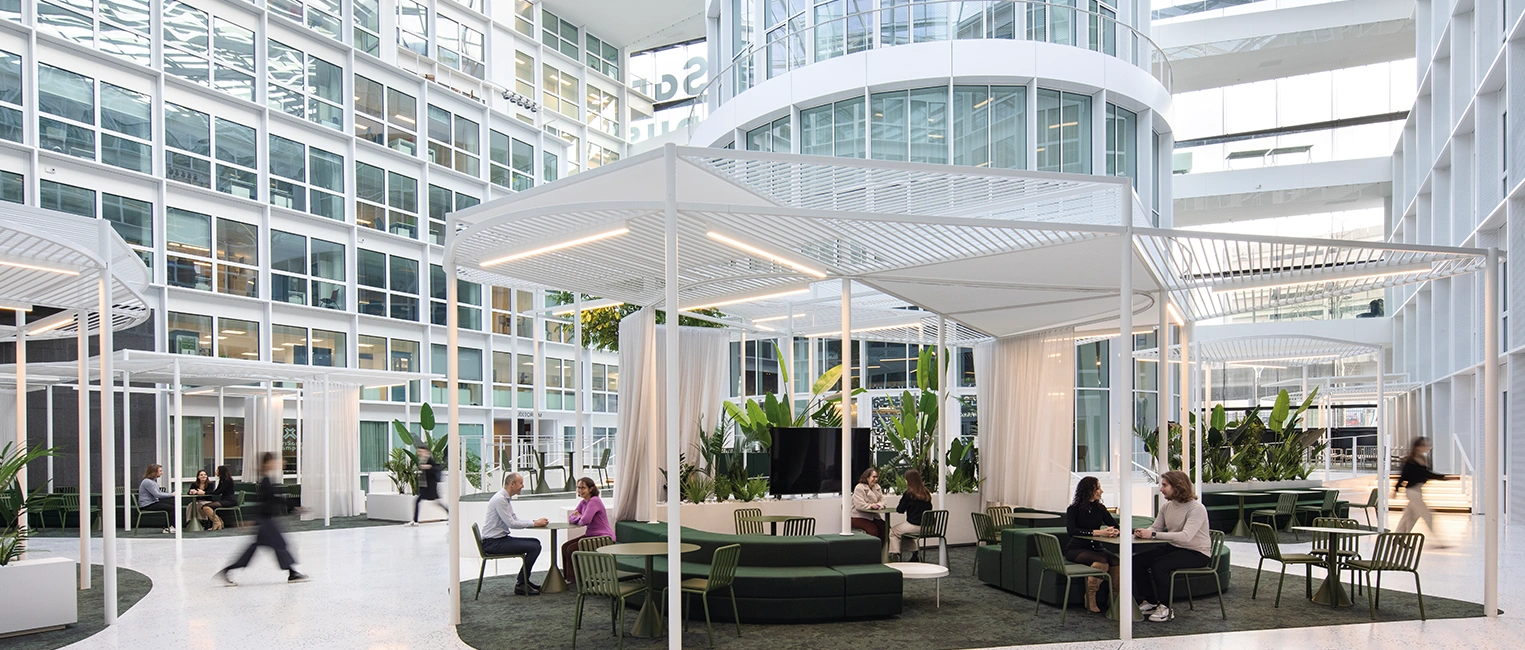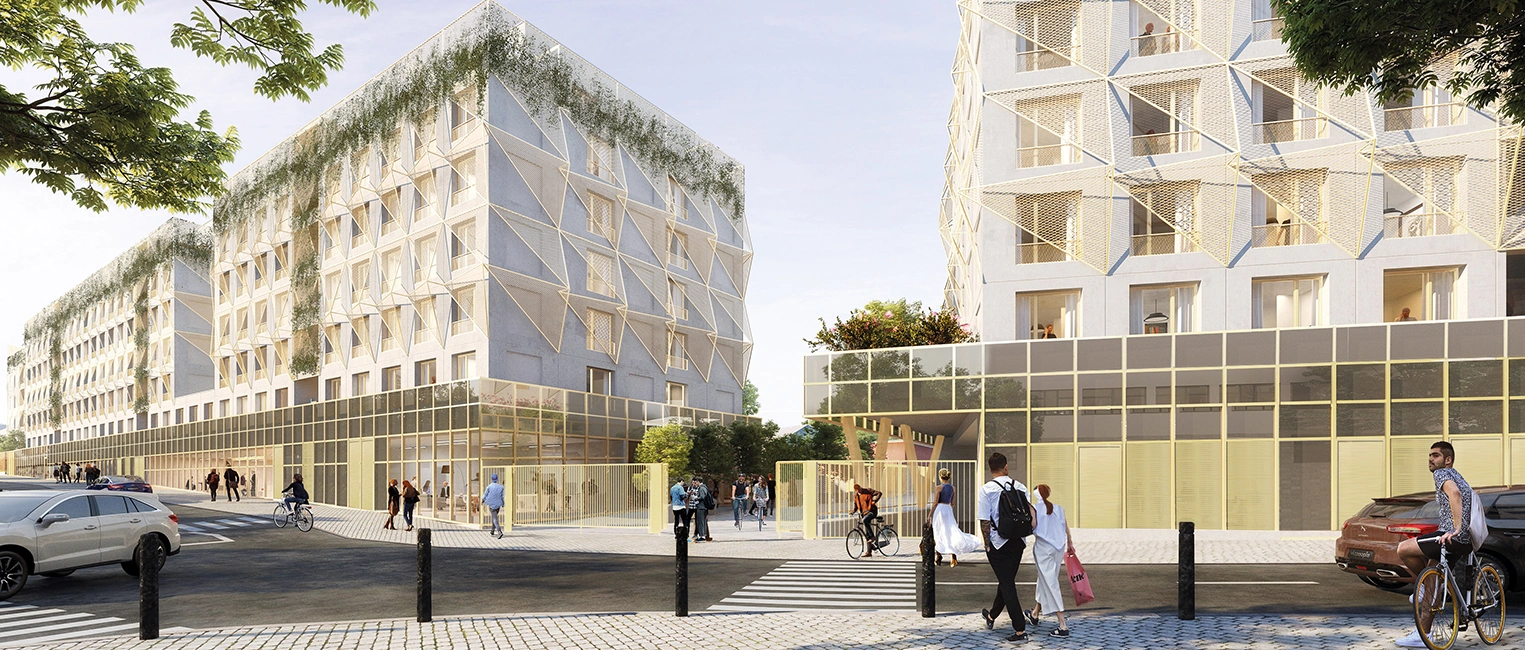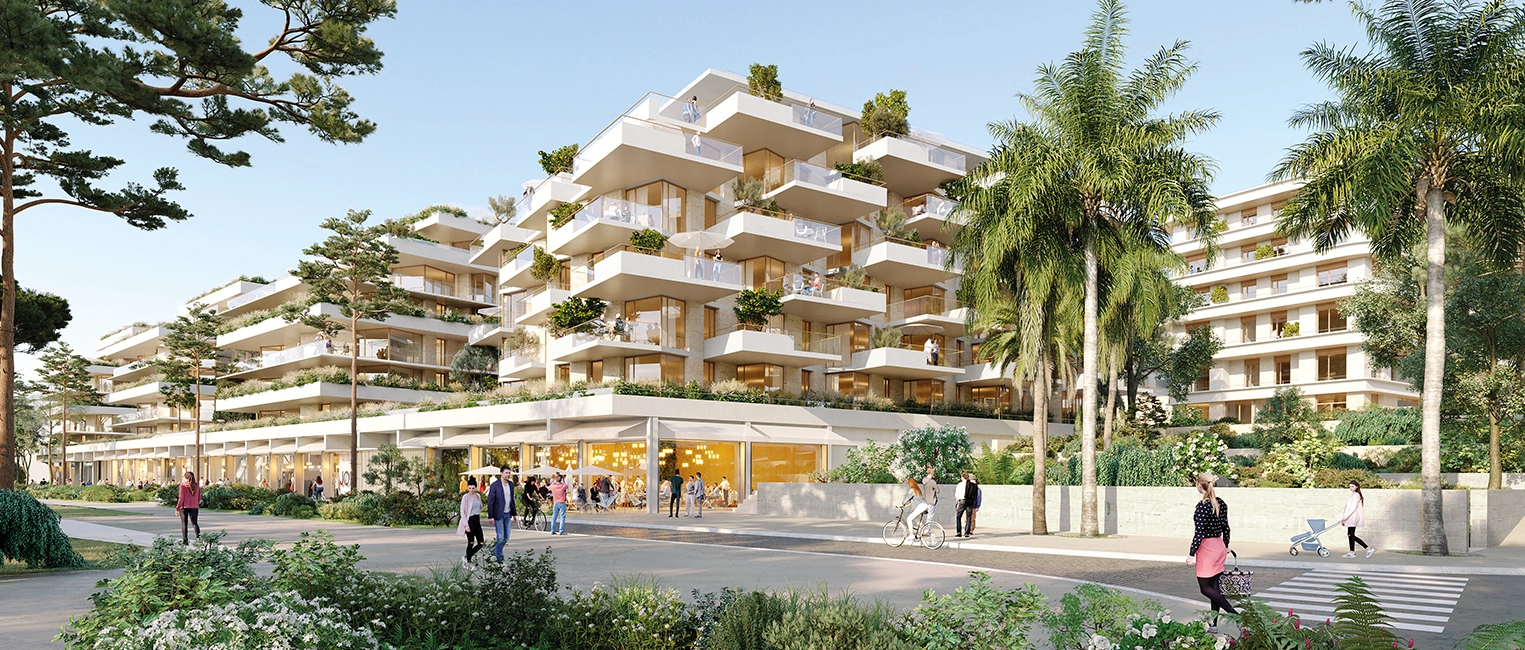« Employees have been essential to Icade’s CSR strategy from its definition to implementation. They took part in formulating the CSR commitments for 2023–2026 through a collaborative, cross-functional approach that involved all the business lines so that employees, regardless of their job description, could identify with them and better implement them. Employees have also become involved in advancing the CSR strategy thanks to the extensive awareness-raising and training sessions they receive. As a result, 96% of employees were made aware of Icade’s low-carbon pathway and CSR issues in 2021. Lastly, in addition to taking Icade’s commitments into account in their day to-day work, they are the leading ambassadors of the Group’s Purpose, as many of them are involved with our societal partners. »
« To ensure the involvement of our employees, the objectives of each manager, as defined during the management and professional development interviews, have systematically included CSR objectives for several years now.
To this end, we, together with the CSR & Innovation Department, have created a handbook for managers to enable them to understand the commitments and translate them into objectives, quantifiable if possible, adapted to their business lines. Since 2022, an amendment to the performance incentive agreement signed by Icade and its social partners has added two performance criteria for its employees, namely procurement from the sheltered work sector and a reduction in CO2 emissions. These two initiatives highlight the key role played by human resources in driving the change entailed in the growing importance of CSR issues in our business activities. We are working on several fronts at the same time to update management models, develop skills to adapt to changes in the business environment, renew our employer promise to meet the new expectations of job seekers and attract the best talent. Broadly speaking, it seems to me that in order to implement a CSR strategy effectively, it is essential to increase the attention paid to the management and well-being of employees. Against a backdrop of major changes, employee care is fundamental because there is no overall performance without social performance and no social performance
without nurturing a culture of mutual trust on a daily basis. »
« As innovation helps to implement the Group’s CSR strategy, we wanted to support its development here at Icade by involving our young talent. This is the aim of the 18-month Innovation Graduate Programme that allows young graduates to become permanent Icade employees and join the CSR & Innovation Department while at the same time working closely with Icade’s business divisions or in one of them. A genuine springboard for their careers, this programme enables young talent to acquire a cross-functional vision of our business by working on innovation projects and to build their future at Icade.In addition, the CSR & Innovation Department has created an Innovation Fund with an annual budget of €2 million to develop, support and contribute to innovation projects for all the Group’s departments. Some projects may result in the creation of start-ups at Urban Odyssey, Icade’s start-up studio.
In 2022, innovation projects were rolled out in the various divisions, supported and financed by the in-house Innovation Fund. »
« The major trends at work in our environment—i.e. the increased rate of climate-related upheavals, biodiversity loss, changes in the way we live and work as well as the ageing of the population—have a profound impact on the way we design cities. Faced with these challenges, Icade has made strong commitments and strategically chose to combine CSR and innovation in the same department in 2020, a combination that is reflected in all of the Group’s business divisions. While our CSR strategy makes it possible to anticipate future upheavals, define commitments and objectives and derive roadmaps to achieve them, innovation has already allowed us to develop the necessary solutions with agility and steer the indispensable transformation of our businesses or the creation of new ones.
Innovation, whether developed in-house or as the result of our collaboration with entrepreneurs from outside the Group, such as our start-up studio Urban Odyssey, plays an essential role at Icade in shaping the city of the future. »
« Far removed from the super high-tech cities built out of nothing in sci-fi movies, I think the city of tomorrow is above all a city on a human scale, diverse and inclusive, enabling people to live together in a favourable environment. It is
also, obviously, a low-carbon city that prioritises renovation over demolition and reconstruction (reducing greenhouse gas emissions by 30%) and minimises land take. More generally, I believe that we must ask ourselves how to repair the city, reuse what already exists, explore biomimetics and solutions inspired by nature to respond to the environmental issues that have become a priority, namely lower energy consumption, heating and cooling methods, reduced impact of construction, climate change adaptation, etc. It is also a city that promotes local solutions through short supply chains, a mix of uses and soft mobility. It provides affordable and inclusive housing to make everyday life easier and more enjoyable for all its residents, regardless of their age or income level. Finally, it is a greener city that makes room for nature, a key issue to which Icade has made a huge commitment in the last few years, as shown by its recent projects in the Portes de Paris business park and the Athletes Village. »
« Responsible for a quarter of France’s greenhouse gas emissions, the real estate industry has a major role to play in fighting climate change. At Icade, we have several priorities, namely to ramp up low-carbon construction, in particular through Urbain des Bois which uses renewable bio-based materials; adapt our buildings to climate change; emphasize the integration of nature into cities; step up the development of reuse processes; reduce land take; and support the conversion of offices into housing with AfterWork by Icade. To create cities where people want to live, Icade also pays particular attention to inclusion, by promoting housing for all and the age, social and economic diversity of its projects. These developments reflect and anticipate new trends, such as the work carried out with Domani, a start-up that designs co-living spaces for seniors looking to continue living in the city centre. Lastly, in order to go faster and farther, I am convinced that it is essential to work with others in the same industry, as Icade does through its many ties and partnerships with customers, local authorities, architects, start-ups and academia. The city of tomorrow is being built today and being built together. »
« Fluctuating rents and property values, rising interest rates, increasing energy costs, health and safety on construction sites, cybercrime, regulatory instability, and the scarcity of certain resources are all risks facing
Icade that have the potential to impact its performance. Identifying and understanding risks allows management to better integrate them into forecasts and improve decision-making. As part of our strategy, we also set and monitor
exposure limits, in conjunction with the Board of Directors. This ultimately allows us to propose control actions tailored to our particular set of circumstances and internal organisation. For example, Icade is exposed to the risk
of obsolescence of its office assets and those associated with the physical impact of climate change. Addressing these risks will allow us to continue to meet tenant expectations by offering some of the most attractive properties on the market. This involves modernising our existing assets and advancing their energy transition, developing new services and including investment criteria to take these issues into account in acquisitions and development projects. »
« We’ve developed a risk management system based on mapping to identify and assess risks, control mechanisms to manage these risks, and controls to verify the effectiveness of such mechanisms. This assures the Company that the risks it may face are well managed, even in an economic environment marked by uncertainty. Risks identified are assessed based on their likelihood of occurrence and estimated impact, and then plotted on a risk map in order to rank and prioritise them. Our goal is to make this map a tool that helps us to identify and manage our risks. In addition, while the business side needs to be kept separate from risk management, close collaboration between
the two is essential. Such collaboration ensures that the system in place is adapted to the realities of each business line, with a view to continually improving our ability to identify and assess risk. »
« We operate in an environment of uncertainty, marked by rising interest rates, inflation, etc. Risks are changing, becoming more complex and interconnected. As such, some risk management mechanisms need to be adjusted. By regularly reviewing our risks and maintaining a continuous dialogue with the operational teams, we should be able pick up on weak signals and identify emerging risks. As risk management is an integral part of the day-to-day operations of each division, managers can react quickly to any changes. This was the case, for example, with energy risk, for which Icade’s teams were very well prepared. Lastly, faced with an unprecedented increase in the number and variety of risks since the outbreak of Covid, we need to make our organisation more resilient. This resilience is twofold—financial, so that we can continue financing our growth, and operational, so that we can adjust and adapt
our processes and continue to deliver on projects and meet customers’ expectations. »
« Faced with the sharp and rapid rise in interest rates and, consequently, in financing costs, Icade’s watchword throughout the year was agility. For example, before interest rates started increasing, the Company issued an 8-year €500 million Green Bond with an attractive 1% coupon in January 2022. In addition, the operational teams at the Office Property Investment Division were able to complete the year’s asset disposal plan (c. €600 million), with 100% of the sales or preliminary sales carried out as early as September. Lastly, we used good judgement in managing the investments of both our Healthcare and Office Property Investment Divisions by choosing to make fewer of them. The annual investment volume was down by 50% in 2022. These three examples reflect Icade’s ability to adapt its business model to a new interest rate environment and enabled the Group to report solid and resilient financial results. »
« Icade has always adhered to a prudent financial policy. This policy is based on three objectives, i.e. to protect its credit rating (Standard & Poor’s BBB+), to have sufficient liquidity to get through periods of financial market turbulence and, finally, to limit the impact of higher interest rates on its business through hedging against interest rate risk. As 96% of Icade’s debt was fixed rate or hedged, the Company was not adversely affected by rising interest rates in 2022. The significant resilience of its balance sheet (average cost of debt of 1.25% and an average debt maturity above 5 years) and strong debt structure will enable the Group to face the new interest rate environment with confidence over the coming years. »
« Environmental requirements are now an integral part of our business models and must be factored into the performance criteria of our divisions. The question is how can we maintain our financial, environmental and operational performance when the scope of what is required is growing wider? I am also convinced that environmental performance should not be seen as a constraint but as a real opportunity and a major factor in the Company’s appeal. It also enhances the quality of our solutions and lays the groundwork for how we will perform in the future. As a result, Icade’s Finance Department has taken this new situation and required investments into account in its indicators. The department also plays a major role in financing these environmental commitments. As such, it is vital that our debt management policy aligns with the CSR issues relevant to our business activities. This reflects Icade’s reliance on sustainable finance that has increased steadily for several years, reaching 43% of the Group’s financing by the end of 2022. Ultimately, all the debt raised would need to be sustainable and used to finance projects having a positive impact on society and the environment.Lastly, Icade published its first EU Taxonomy Report in 2022. This groundbreaking initiative reconciles environmental and financial considerations for the first time by asking companies to use financial indicators to monitor their economic activities aligned with environmental requirements. Taxonomy reporting represents a new opportunity to help us better understand the environmental performance of our business and, consequently, our responsibilities in this domain. »








